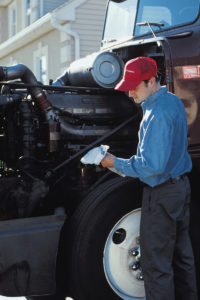Troubleshooting Common Diesel Engine Issues

There are some common diesel engine issues every freight driver should be aware of so that these issues can be avoided through frequent inspections and routine maintenance.
Diesel engines have long been the workhorses of various industries due to their robustness and fuel efficiency. However, like any machinery, they are not immune to problems. Understanding these common issues and knowing how to mitigate risks is essential for keeping your diesel engine running smoothly and efficiently. Remember—when in doubt, head straight to your trusted mechanic!
Glow Plug Failure
Glow plugs are crucial for starting diesel engines, especially in cold weather. When these plugs malfunction, starting the engine becomes difficult. Regular inspection and replacement of glow plugs can help prevent this issue. Additionally, ensuring the use of high-quality glow plugs and using a block heater in cold conditions can reduce strain on the plugs.
Fuel Contamination
Fuel contamination is a major concern in diesel engines. Water, dirt, and other debris can infiltrate the fuel system, causing engine misfires, decreased power, and poor fuel efficiency. To mitigate this risk, invest in high-quality fuel filters and separators. Regularly check and replace these components according to the manufacturer’s recommendations. Moreover, sourcing fuel from reputable sources can minimize the chances of contamination.
Clogged Fuel Injectors
Clogged fuel injectors can lead to uneven combustion and decreased engine performance. Using low-quality fuel or irregular maintenance can contribute to this problem. To prevent clogs, use fuel additives that promote injector cleanliness. Regularly servicing the injectors as part of routine maintenance can also help prevent issues.
Turbocharger Problems
Turbochargers enhance engine efficiency by forcing more air into the combustion chamber. Common problems include wear and tear, leaks, and even complete failure. Regularly checking the turbocharger for leaks, ensuring proper oil supply, and allowing the engine to idle for a few minutes before shutting it off (to allow the turbo to cool down) are effective ways to mitigate these risks.
Overheating
Diesel engines can overheat due to a variety of reasons, including cooling system failures, blocked radiators, and coolant leaks. Regularly inspecting and maintaining the cooling system, ensuring proper coolant levels, and addressing any leaks promptly can help prevent overheating. Additionally, avoid overloading the engine or pushing it beyond its limits, as this can contribute to overheating.
Air Filter Blockages
A clean air supply is essential for optimal engine performance. Air filter blockages can lead to reduced power and efficiency. Regularly inspect and clean or replace air filters as needed. Operating in dusty or dirty environments may require more frequent filter changes.
Oil Quality and Levels
Maintaining proper oil levels and using high-quality oil is vital for diesel engines. Low oil levels or using the wrong type of oil can lead to increased friction and wear. Regularly check oil levels and adhere to the manufacturer’s recommendations for oil changes. Using oil additives can also help maintain engine health.
Carbon Deposits
Carbon deposits can accumulate on engine components, leading to decreased efficiency and performance. Using high-quality fuel and driving at varying speeds can help prevent carbon buildup. Regularly using fuel additives designed to clean the fuel system can also be beneficial.
MIDDLETON & MEADS IS YOUR ONE-STOP-SHOP FOR ALL OF YOUR VEHICLE’S NEEDS.
Need to repair your truck or bus? Contact Middleton & Meads today! Middleton & Meads provides quality truck and bus repair, service, and fleet management for the Baltimore, MD area. We have over 90 years of experience in the trucking industry and will provide you with customer service like you have never experienced before! If you are interested in seeing how we can help your business, give us a call at (410) 752-5588 or visit us online today! For more articles and trucking tips, follow us on Facebook, Twitter, Flickr, and LinkedIn.

